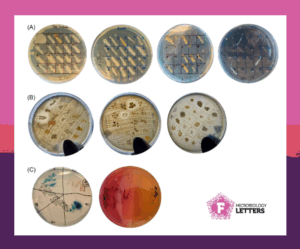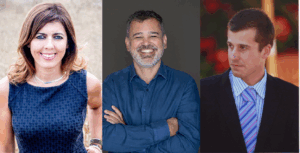#FEMSmicroBlog: MicroMundo@Oeiras as a citizen science project to tackle antibiotic resistance
Antibiotic resistance is one of the greatest health threats of our time. Every year, infections caused by resistant bacteria cause thousands of deaths and put immense pressure on healthcare systems. Although scientists are racing to develop new antibiotics, the number of effective drugs is rapidly dwindling. In this global battle, it is not just doctors and researchers who can make a difference. Citizens, too, can play a key role. This is the idea behind the project and research letter “MicroMundo@Oeiras: Citizen Science promoting antibiotic stewardship, discovery of new antimicrobials and monitoring of soil resistance” in FEMS Microbiology Letters, discussed by Maria João Leão, Pedro Matos Pereira, and Paulo Durao. #CulturePlate
Inspiring the community with citizen science projects
Citizen science is a collaborative approach that actively involves non-scientists in the scientific inquiry. It engages communities in real-world research challenges to democratize science, promote scientific literacy, and expand the reach of data collection. By contributing to meaningful investigations, students, teachers, and other members of the public gain a deeper understanding of science while helping generate valuable data for researchers.
One such citizen science project is MicroMundo@Oeiras, which is based in Oeiras Municipality in Portugal. It involves scientists from the Instituto de Tecnologia Química e Biológica (ITQB NOVA), university and secondary school students, as well as teachers.
Inspired by the global Tiny Earth and other MicroMundo initiatives, the project invites participants to explore their local environment – such as parks, gardens, or schoolyards – and collect soil samples following safety and hygiene guidelines.
Participants collect soil from undisturbed areas using sterile tools, label the samples with the location and date, and document basic site information. Once brought into the lab, students and researchers isolate bacteria from the samples, with the article “MicroMundo@Oeiras: Citizen Science promoting antibiotic stewardship, discovery of new antimicrobials and monitoring of soil resistance” in FEMS Microbiology Letters outlining the results of this project.
Citizen science to learn about bacteria and antimicrobial resistance
Beyond MicroMundo@Oeiras’ contribution to scientific discovery, the project aims to educate and raise awareness on antibiotics. The student community involved gains a deep understanding of how antibiotics work, what drives resistance, and how everyday behaviors – such as the misuse or improper disposal of antibiotics—can worsen the problem.
The study analysed over 750 bacterial isolates in samples collected by citizen scientists and identified 15 strains with potential antimicrobial activity. These strains will be further studied to determine whether they produce new or already known antibiotics. Additionally, monitoring antibiotic-resistant bacteria in the soil using molecular biology tools helps researchers understand how resistance appears and spreads in the environment.

One of the most exciting aspects of MicroMundo@Oeiras is its scalability. This project can be replicated and adapted to other regions, schools, or even countries. Many participants were inspired by science while several of the youngest experienced the scientific method for the first time.
MicroMundo@Oeiras against antimicrobial resistance
From a policy perspective, this project also supports national and international goals related to antimicrobial resistance. The European Union, World Health Organization, and many governments have implemented action plans that call for surveillance and education on antimicrobial resistance. MicroMundo@Oeiras delivers both. That’s why this study argues that such low-cost, community-based science programs deserve more support. They help in both discovering new drugs and fostering the responsible use of current antibiotics.
In a world where AMR threatens to undo decades of medical progress, MicroMundo@Oeiras shows that solutions can come from the ground up – literally! By empowering citizens to become part of the solution, we’re building a healthier, more informed, and more resilient society.
- Read the article “MicroMundo@Oeiras: Citizen Science promoting antibiotic stewardship, discovery of new antimicrobials and monitoring of soil resistance” by Henriques et al. in FEMS Microbiology Letters (2025).
About the authors of this blog

Maria João Leão coordinates the Ciência+Cidadã Programme at ITQB NOVA, promoting a citizen science strategy in collaboration with Oeiras Municipality and partners. She has experience in citizen science, science communication, and fundraising. From 2012–2022, she was Executive Director of the non-profit Association Maratona da Saúde in partnership with RTP Public Portuguese television. She holds degrees in Biology, Biotechnology, and a PhD in Virology and Cancer. She is active in the RPCC (Portuguese Citizen Science Network), IMPETUS Citizens Panel and SciComPT.
Pedro Matos Pereira is a cell biologist and the team leader of the Intracellular Microbial Infection Biology (IMIB) laboratory at ITQB NOVA, Portugal. His research focuses on understanding the dynamics between human cells and facultative intracellular bacterial pathogens using a combination of advanced microbiology, cell biology and fluorescence microscopy approaches. This research focus is potentiated by engaging with citizen science projects, such as MicroMundo@Oeiras.
Paulo Durão is a researcher at the ITQB NOVA in Portugal, with expertise in biochemistry, microbiology, and antimicrobial resistance. His research explores biotechnological solutions to antibiotic resistance. Together with Maria João and Pedro Matos Pereira, he coordinates the MicroMundo@Oeiras project, a citizen science project focused on antibiotic discovery and awareness. He is committed to bridging science and society to promote responsible antibiotic use and foster the discovery of new antimicrobial agents.
About this blog section
The section #TheCulturePlate for the #FEMSmicroBlog aims to bring science closer to different audiences and to tell more about the scientific or personal journey to come to the results.
| Do you want to be a guest contributor? |
| The #FEMSmicroBlog welcomes external bloggers, writers and SciComm enthusiasts. Get in touch if you want to share your idea for a blog entry with us! |
